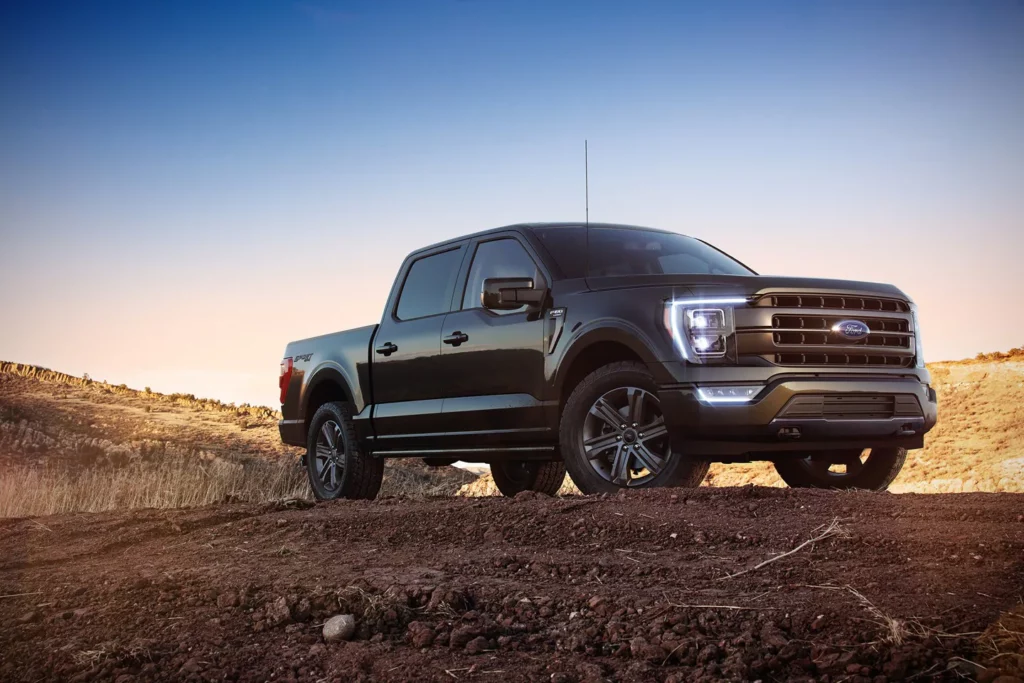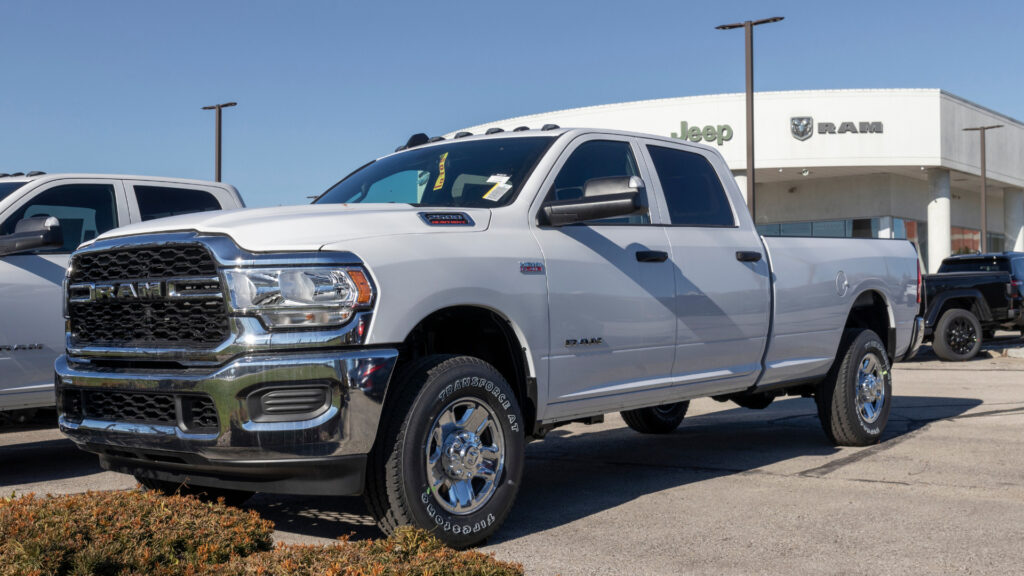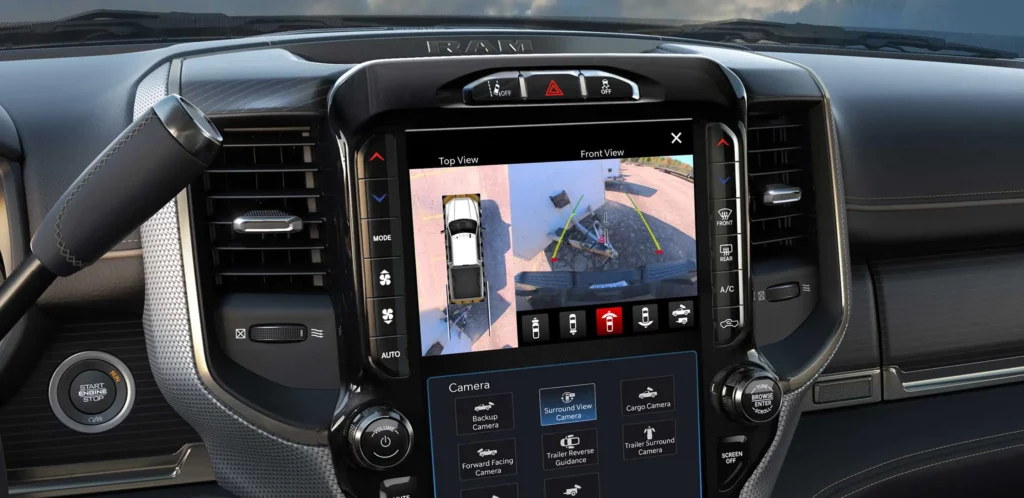Table of Contents Show
If you want to ruffle some feathers amongst truck owners, tell them their truck isn’t as good as another truck. Tell a RAM owner that Ford is better (or vice versa) and it’ll set them off like a bottle rocket on the fourth of July. One highly debated topic regarding trucks is whether diesel or gas trucks are better. While some truck debates are a matter of preference, this one comes down to facts. Today, we’re looking at the diesel vs gas truck debate and which is better. Let’s get started!
What’s the Difference Between Gasoline and Diesel Engines?
Diesel and gasoline engines are both internal combustion engines. They both convert chemical energy into mechanical energy to propel vehicles forward.
Converting this energy involves a series of small explosions; however, where they differ is how these explosions occur.
The fuel mixes with air in a gasoline engine and is then compressed by pistons and ignited by a spark from the spark plugs.
On the other hand, a diesel engine compresses the air first, and from there, the fuel gets injected. The air heats up during the compressions, and the fuel ignites.
Pro Tip: What Happens If You Put Gas in a Diesel Engine? Click here to find out!

Diesel vs Gas Trucks: Pros and Cons
There are pros and cons to both diesel and gas-powered trucks. There’s not a one-size-fits-all truck that is the answer in every situation.
So let’s look at the pros and cons of each type of truck!
Diesel Powered Truck Pros
Diesel trucks can generate a tremendous amount of power. They’re workhorses that practically beg you to challenge them and push their limits.
However, they’re not only much more powerful trucks, but they are more efficient when being put to the test. You’ll notice a substantial difference in fuel efficiency when using diesel instead of gas.
These are two of the largest reasons why semis and other large vehicles use diesel. Their efficiency and power are ideal for hauling heavy loads over long distances.
Combine these qualities with the fact that these engines can last hundreds of thousands of miles, and it’s practically a no-brainer to choose a diesel engine.
Diesel Powered Truck Cons
Diesel trucks are powerful, but a diesel engine is substantially heavier than a gas engine. Some three-quarter-ton truck owners discover that their trucks can’t carry nearly as much as anticipated.
This is mainly because a diesel engine is 800 lbs to 900 lbs heavier than a gas engine. The increased weight of a diesel engine eats away at a truck’s payload capacity, which can become a factor when towing and carrying tools or gear.
Another con for choosing a diesel truck is the price. While all trucks are expensive, a diesel truck typically costs around $10,000 more than a gas truck. While this cost is somewhat offset by the longevity of the diesel engine and its ability to retain value, it’s a massive upfront cost.

Gas Powered Truck Pros
A gas truck is typically much more affordable than a diesel upfront. If you’re looking to own a truck but don’t like how a diesel truck’s price tag looks, a gas truck’s price tag may be more attractive. You can typically get a gas truck for approximately $10,000 cheaper than the same model in a diesel version.
The cost of maintenance on a gas truck is also typically a bit easier on the wallet. Oil changes for a gas truck are approximately $30 to $60. However, an oil change on a diesel truck could cost you upwards of $150. Oil changes aren’t the only maintenance that is cheaper either. Fuel filters, coolant flushes, or anything related to the DEF system found on diesel trucks are massively more expensive maintenance items than on a gas truck.
Gas Powered Truck Cons
While a gas truck can have a higher payload, it’s not even close when towing. A gas truck can typically pull about half the weight of a comparable diesel truck. You may have a big and beautiful truck, but once you start looking at the towing specs, they fall well short compared to a diesel truck.
While a gas truck may be more efficient when not towing, those fuel efficiency numbers go out the window once you start. Gas trucks are typically terrible when it comes to fuel efficiency when towing. It’s not uncommon to see gas trucks getting single digits when it comes to mileage. Even with gasoline being cheaper than diesel, the savings will quickly be eaten up if you’ll be towing regularly.

Diesel vs Gas Trucks: Head to Head
To get the most accurate understanding of the debate, we will look at how these two truck types stack up against each other head to head. There can only be one victor in this showdown, and we promise you we’ll declare an obvious winner. Let’s go!
Cost
Price is one of the first things that many customers look for when truck shopping. Comparing the price is relatively easy as some trucks like the Ford F250 and the Ram 2500 come in diesel and gasoline options. It’ll cost you if you want to upgrade from a gasoline to a diesel engine. The Ford F250 will be an additional $10,495 and $9,495 for the Ram 2500.
If price is your biggest concern, a gas truck will be your best bet. As long as the truck can do all you need, you can save thousands of dollars by going with a gas truck instead of a diesel.
Towing
If you’re buying a truck for towing, it’s important to know how they stack up against each other. The towing numbers aren’t recommendations, and if you want to stay safe, you must follow them whether you’ll be towing regularly or on occasions. When it comes to towing, diesel is the clear winner.
The 2021 Ram 2500 Big Horn gas model can only tow 14,460 lbs and has a payload capacity of 3,330 lbs. However, if you chose the diesel engine, you would have reduced the payload capacity to 2,530 lbs but bumped the towing capacity up to 20,000 lbs. This increase in towing capacity for a diesel truck is pretty standard across all truck manufacturers.

Fuel Economy
Diesel engines are typically 20% to 35% more efficient than their gas engine counterparts. The fuel packs more energy (10% to 15% more), making it more efficient under normal circumstances. However, where a diesel engine outshines a gas engine is when put to the test. It’s normal to see a drop in MPGs when towing, but diesel engines typically suffer much less of a loss than gas engines.
Cost to Maintain
Maintenance on a diesel engine is substantially more expensive; however, they last longer. Some maintenance items can cost twice as much on a diesel engine than on a gas engine. You also must consider that newer diesel trucks have complicated exhaust systems to be more environmentally friendly.
As with any complex system, it’s not cheap if something fails in the DEF system. We’ve heard truck owners getting stuck with thousands of dollars in repairs due to a faulty DEF system. The potential massive mechanic bill is enough to keep many weary truck buyers away unless they need a diesel truck.
Keep in Mind: We all know gas isn’t cheap right now, so here are 5 ways to get better gas mileage during the gas price spike.

Dependability and Average Lifespan
Diesel engines are built to last and have a substantially longer life expectancy. While a gasoline engine can go 200,000 miles, a diesel truck can easily go 500,000 miles. They’re heavier and sturdier engines that simply get the job done.
No matter which type of engine you choose for your truck, it’s essential to stay up on routine maintenance. Changing your oil, rotating tires, and checking all fluids will help ensure your truck stays on the road and out of the mechanic’s shop.
Resale Value and Depreciation
It’s a tough pill to swallow when you know it depreciates when you drive your new vehicle off the dealership lot. Most vehicles aren’t great investments as they typically depreciate relatively quickly. However, Green Car Reports states that a diesel vehicle’s value is typically 60% to 70% higher than gasoline.
If you’re not planning to own your truck for very long, a diesel truck gives you the best chance of keeping more money in your pocket. You don’t want to be upside down on your vehicle, especially if you didn’t make a large down payment when purchasing it.

Your Choice Depends on Your Needs
When it comes down to declaring a victor, there’s a clear winner. A diesel truck is the best option if you’re planning to use it for towing and need a powerful and reliable truck that will last for years to come. However, if you’re not planning to tow huge weights and plan to own your vehicle for many years, the depreciation isn’t likely going to bother you nearly as much as buying a gasoline truck.
We can’t understate that there’s no one-size-fits-all truck because every truck owner uses their truck differently. Where do you fall in the diesel vs gas truck debate?






